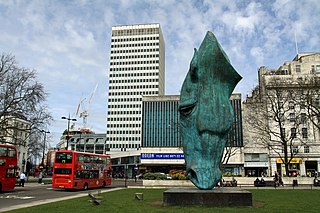Related Research Articles

Estoppel is a judicial device in common law legal systems whereby a court may prevent or "estop" a person from making assertions or from going back on his or her word; the person so prevented is said to be "estopped". Estoppel may prevent someone from bringing a particular claim. Legal doctrines of estoppel are based in both common law and equity. Estoppel is also a concept in international law.

Central London Property Trust Ltd v High Trees House Ltd [1947] KB 130 is a famous English contract law decision in the High Court. It reaffirmed and extended the doctrine of promissory estoppel in contract law in England and Wales. However, the most significant part of the judgment is obiter dicta as it relates to hypothetical facts; that is, the landlord did not seek repayment of the full wartime rent.
Consideration is an English common law concept within the law of contract, and is a necessity for simple contracts. The concept of consideration has been adopted by other common law jurisdictions, including the US.

Foakes v Beer[1884] UKHL 1 is an English contract law case, which applied the controversial pre-existing duty rule in the context of part payments of debts. It is a leading case from the House of Lords on the legal concept of consideration. It established the rule that prevents parties from discharging an obligation by part performance, affirming Pinnel's Case (1602) 5 Co Rep 117a. In that case it was said that "payment of a lesser sum on the day [i.e., on or after the due date of a money debt] cannot be any satisfaction of the whole."

Hughes v Metropolitan Railway Co [1877] is a House of Lords case considered unremarkable for many years until it was resurrected in 1947 by Lord Denning in the case of Central London Property Trust Ltd v High Trees House Ltd in his development of the doctrine of promissory estoppel. The case was the first known instance of the concept of promissory estoppel.

Estoppel in English law is a doctrine that may be used in certain situations to prevent a person from relying upon certain rights, or upon a set of facts which is different from an earlier set of facts.
Pinnel's Case [1602] 5 Co. Rep. 117a, also known as Penny v Cole, is an important case in English contract law, on the doctrine of part performance. In it, Sir Edward Coke opined that a part payment of a debt could not extinguish the obligation to pay the whole.
Sir Andrew Centlivres Longmore, styled The Rt Hon. Lord Justice Longmore, is a British lawyer and retired judge.

Combe v Combe [1951] 2 KB 215 is a famous English contract law case on promissory estoppel. An ex-wife tried to take advantage of the principle that had been reintroduced in the High Trees case to enforce her husband's promise to give her maintenance. The Court held that promissory estoppel could not be applied. It was available only as a defence and not as a cause of action.

D & C Builders Ltd v Rees [1965] EWCA Civ 3 is a leading English contract law case on the issue of part payment of debt, estoppel, duress and just accord and satisfaction.

Consideration is a concept of English common law and is a necessity for simple contracts but not for special contracts. The concept has been adopted by other common law jurisdictions.

Waltons Stores (Interstate) Ltd v Maher, is a leading case in Australian contract law. The Australian High Court decided that estoppel, in certain circumstances, could be a cause of action.

Williams v Roffey Bros & Nicholls (Contractors) Ltd[1989] EWCA Civ 5 is a leading English contract law case. It decided that in varying a contract, a promise to perform a pre-existing contractual obligation will constitute good consideration so long as a benefit is conferred upon the 'promiseor'. This was a departure from the previously established principle that promises to perform pre-existing contractual obligations could not be good consideration.
Landmark Cases in the Law of Contract (2008) is a book by Charles Mitchell and Paul Mitchell, which outlines the key cases in English contract law.
Unconscionability in English law is a field of contract law and the law of trusts, which precludes the enforcement of voluntary obligations unfairly exploiting the unequal power of the consenting parties. "Inequality of bargaining power" is another term used to express essentially the same idea for the same area of law, which can in turn be further broken down into cases on duress, undue influence and exploitation of weakness. In these cases, where someone's consent to a bargain was only procured through duress, out of undue influence or under severe external pressure that another person exploited, courts have felt it was unconscionable to enforce agreements. Any transfers of goods or money may be claimed back in restitution on the basis of unjust enrichment subject to certain defences.

Crabb v Arun District Council [1975] EWCA Civ 7 is a leading English land law and contract case concerning "proprietary estoppel". Lord Denning MR affirmed that where agreements concern the acquisition of rights over land, there is no need for both parties to provide a consideration for upholding the bargain. While promissory estoppel cannot found a cause of action it was held that in the peculiar situation of land, consideration is not necessary at all.
In re Selectmove Ltd[1993] EWCA Civ 8 is an English contract law case, concerning the doctrine of consideration, and part payments of debt.

HBF Dalgety Ltd v Morton [1987] 1 NZLR 411 is a leading case in New Zealand regarding accord and satisfaction; it reinforces the English case of Foakes v Beer in New Zealand.

Hirachand Punamchand v Temple [1911] 2 KB 330 is often cited as one of the exceptions to the accord and satisfaction rule laid out in Foakes v Beer. In that case, it is held that an agreement to accept part payment of a debt cannot validly discharge the entire debt. In Hirachand Punamchand v Temple, part payment of a debt is held to be valid because it is supplied by a third party and not the debtor.

Rock Advertising Ltd v MWB Business Exchange Centres Ltd[2018] UKSC 24 is a judicial decision of the Supreme Court of the United Kingdom relating to contract law, concerning consideration and estoppel. Specifically it concerned the effectiveness of "no oral variation" clauses, which provide that any amendments or waiver in relation to the contract must be in writing.
References
- ↑ Foakes v Beer [1884] UKHL 1 , 9 App Cas 605, (1883-84) LR 9 App Cas 605, (1884) 9 App Cas 605(16 May 1884)
- ↑ A Trukhtanov, ‘Foakes v Beer: reform at common law at the expense of equity’ (2008) 124 LQR 364-368
- ↑ Williams v Roffey Brothers & Nicholls (Contractors) Ltd. [1991] 1 QB 1 (CA)
- ↑ Poole, Jill. Casebook on Contract Law 11th edition. p. 145.
- ↑ Pearce, Robert. "A Promise is A Promise" (PDF).